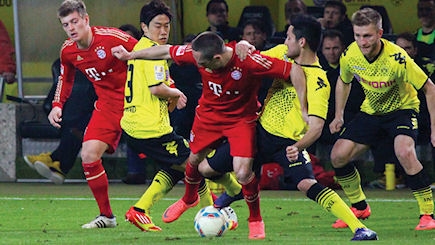This article first appeared in the Jul/Aug 2013 issue of World Gaming magazine.
Bayern Munich and Borussia Dortmund went head to head in an “all-German” Champions League final on 25 May, the first time in the competition’s history two Bundesliga clubs have contested the biggest club game of the year. It might be premature to brand it as the dawn of a new era but surely Germany is signaling its intent.
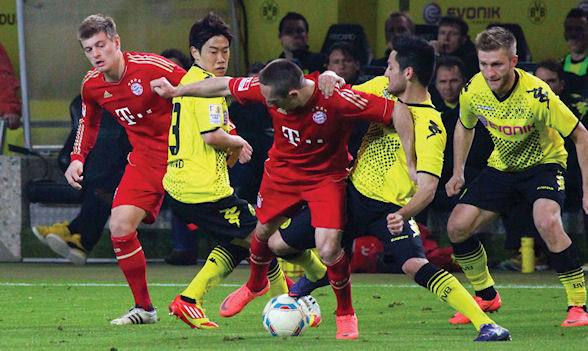
The script writers probably wouldn’t have ended it this way. Season 2012/13 represented the 150th anniversary of the English FA and to celebrate, UEFA decided it was fitting to host the Champions League final at iconic Wembley Stadium right in the heart of London – despite the fact that Wembley had also hosted the final just two years earlier (won by Barcelona). Yet there were no English sides in this year’s final with German rivals Bayern Munich and Borussia Dortmund fighting it out instead – Bayern claiming their fifth title with a thrilling 2-1 win. Given the traditional hostility between these two countries, German fans couldn’t have wished for anything sweeter than to do so at the home of English football.
Nobody could deny the two German giants were deserving finalists this season. Bayern’s road to the final was a tough ride, with Arsenal and Juventus among their victims before they spectacularly dethroned Barcelona in the semi-finals 7-0 on aggregate in a contest that will stamp the name of Jupp Heynckes, their manager, in club folklore.
Dortmund’s path to Wembley wasn’t easy either. Of course, clubs like Shakhtar Donetsk and Málaga aren’t of the same stature as Juventus or Arsenal, but their semi-final thrashing of the other Spanish giant, Real Madrid, was extraordinary as they caught José Mourinho’s men completely off guard.
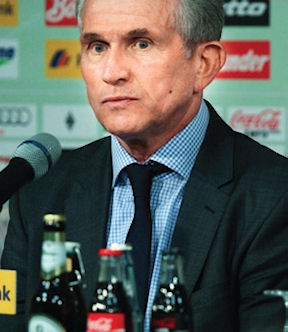
Bayern manager Jupp Heynckes enjoyed a stunningly successful season
One-nation finals had only happened three times in Champions League history before this season and not at all until the format was changed in 1992 to accommodate more than just the national champions from each of the European leagues. Even then it took a few years until La Liga finally made the breakthrough as Real Madrid and Valencia went head-to-head in 1999/2000. Serie A caught up when AC Milan and Juventus met in the 2002/03 season and England enjoyed their day in the sun when Manchester United and Chelsea met in 2008. Now it’s Germany’s time to shine.
In hindsight, the recent rise of German football was foreseeable as early as 2010. In the FIFA World Cup in South Africa, a young German side, led by Joachim Löw, blew some much-needed fresh air into the international arena. Despite falling just short of the final after losing to eventual champions Spain, the second youngest German side ever assembled for a World Cup captured the imagination with their attacking style – their 16 goals the most of any nation in the tournament. Young guns such as Mesut Özil, Toni Kroos and Golden Boot Thomas Müller were brilliant and it comes as no surprise that these German fledglings played key roles in Munich and Dortmund’s success this past season.
Germany’s resurrection as a football stronghold can largely be attributed to the investment and concentration on academy football of Deutscher Fußball-Bund (DFB). This investment resulted from a memorable humiliation all Germans would rather forget, the 2000 Euro Cup. Germany scored just a solitary goal in the group stage, collecting one point in the process and were knocked out of the tournament as the bottom team in their group. That German national team was full of old legs and out of touch with the changing style of modern football. Incensed by the humiliation, DFB created a set of youth training plans for the whole nation and pledged to invest as much as €20 million every year on academy football. Players such as Müller, Özil, Marco Reus and Kroos are all products of this investment.
At the same time as these young players were trained for the high tempo and technical proficiency of modern football, young coaches were also learning the latest tactical nuances. The previous emphasis on discipline and psychology progressed instead to technique and tactical awareness. Young managers such as Löw, who was 46 when he became national team manager, and Dortmund’s Jürgen Klopp were quick to learn and haven’t looked back.
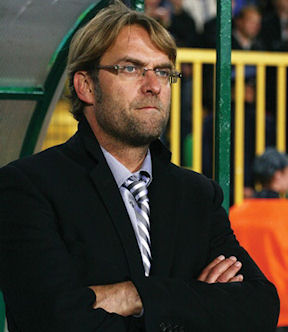
Jurgen Klopp has worked wonders at Dortmund
Heynckes is worthy of specific mention, given that he was ahead of his time when he first took charge of Bayern in 1988. Even then, when rigid defense and balanced football was the norm, Heynckes taught his players to organize a high defensive line, play one touch football and control possession – traits seen more recently in Pep Guadiola’s brilliant Barcelona side. Heynckes’ vision of football was almost 20 years ahead of everyone else’s in Germany and although he didn’t enjoy such success back then, his second stint in charge of Bayern has proved far more fruitful now he is blessed with young talent able to execute his instructions.
There has been a lot to like about German football this year, from the 25,000 strong south stand area of Dortmund’s Westfalenstadion that created such a memorable atmosphere in games against Málaga and Real Madrid to the increased riches that have enabled clubs like Dortmund to reduce some ticket prices to as low as €190 per season or just €11 a match! According to Deloitte, the average ticket price in the Bundesliga is just €19.32, compared with €51 in the EPL and €33 in La Liga.
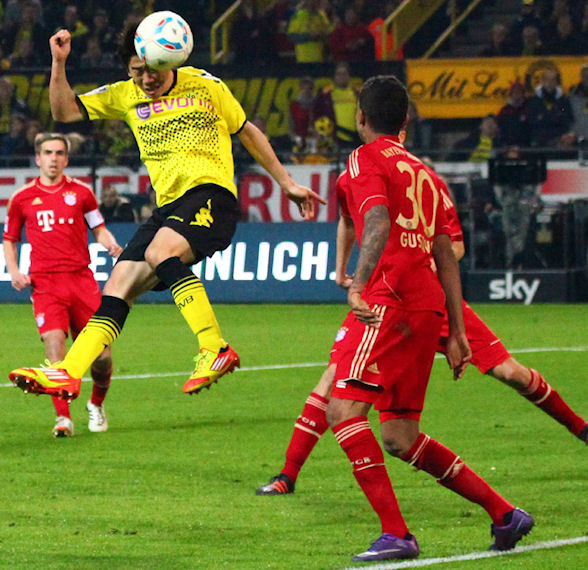
But it is too early to be flagging the dawn of a new era for German football given that greater challenges await. It will be interesting to see how Dortmund handle the loss of striker Robert Lewandowski, or that of wunderkind Mario Götze, ironically off to Bayern Munich next season after Bayern’s €37 million bid triggered a release clause in Götze’s contract. More importantly, the European super clubs have already started sniffing around and it will take a concerted effort on the part of the Germans to stave them off much longer.
In the meantime, Germany deserves to celebrate its Champions League achievement and their return to the rungs of the football powerhouse ladder.

